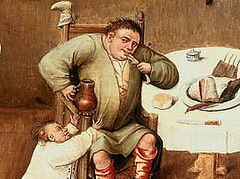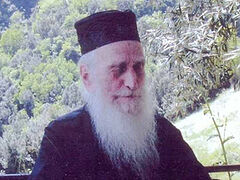-
Part 2: On Battling Pride
-
Part 3: The Spirit, and Spirits
-
Part 4: The Role of Christian Women
-
Part 5: On Seeking the Kingdom of God
-
Part 9: The Silence of the Theotokos
-
Part 10: On the Monastic Life
-
Part 12: The Path to Healing and Salvation
-
Part 13: Every Man Must Guard His Heart
 Photo: Y.Kostygov / expo.pravoslavie.ru
Photo: Y.Kostygov / expo.pravoslavie.ru
Christian parenting
At the most tender age, most Christian children, by the fault of their parents and under the influence of educators, are accustomed to useless bodily exercises, and they are given development, knowledge, and skills that are only useful for temporary, earthly life. Throughout the rest of their lives, they continue to educate themselves and prepare only for temporary successes in the world, completely without thinking about God, about pleasing Him, and about their eternal salvation.
On the other hand, it’s Christian education that should begin from the most tender age. St. Macrina, the sister of St. Basil the Great, recalling her childhood, said that her mother used to sit her on her lap and make her pronounce the sweetest name of Jesus Christ with her weak and babbling tongue, which kindled love for the Lord in St. Macrina’s heart.
“The soul of an infant is the temple of God,” says Blessed Jerome. “Therefore, we have to watch to make sure it neither hears nor says anything but the truths of the Gospel; it should understand neither shameless fables nor seductive songs; its tender tongue should ascend only to God.”
How can we raise a child so that in coming of age, he wants nothing more than to be a true Christian? You have to surround him with sanctity and virtues. The parents’ faith and piety should lead the child to a life in the Church, to frequent communion of the Holy Mysteries of Christ.
Christian education, once begun, must continue in childhood, adolescence, and youth.
When a child’s powers begin to awaken, the parents should increase their attention, for the sin living in a man will surely provoke a fight against the desire for God, and children can’t fight for themselves; then begins the parents’ battle with the sin living in the child. They must guide and direct the child’s physical and spiritual powers so they’re not taken captive by carnal pleasures, inquisitiveness, self-will, and self-gratification. This is the main thing; this is the wisdom of Christian education.
There are mothers and fathers who see no sin in their mad love for their child, but who idolize him based on the false notion that he’s their possession, a part of themselves, loving not the soul of their child, which belongs only to God the Creator, but his bodily features, in which they see themselves. There are parents who don’t realize that children are entrusted to them by God only as a pledge of obedience, given as a commandment of love, for their family life, and entrusted as God’s possession, acquired by the Blood of Christ the Savior Who was crucified for them.
Christianity demands that the family be a small church, and parents look at children as a gift from God, as an entrusted pledge, for whom they are responsible before the Heavenly Father. This imposes on them the obligation to raise their baptized children as children of God, for His Kingdom.
Christ is Risen!
We are forgiven, we are saved and redeemed—Christ is Risen! These three words say it all.
Our faith, our hope, love, Christian life, all our wisdom, enlightenment, the Holy Church, our heartfelt prayer, and our entire future are based on them.
These three words destroy all human calamities, death, and evil, and grant life, blessedness, and freedom! What miraculous freedom!
Is it possible to get tired of repeating, “Christ is Risen!?” Can we get sick of hearing, “Christ is Risen!?”
The purpose of the Christian life
If we remember that we have our being, powers, senses, reason, heart, and will from God, that we receive all the many benefits from the Lord and can be participants in blessedness and eternal life in His Heavenly Kingdom, then we can’t doubt that the purpose of our lives is to serve God and glorify the Creator.
All sciences and arts have their purpose and their end, the Holy Fathers say. The farmer endures the heat and cold, works tirelessly, plows the land, with the aim of clearing it of all outside rubbish and making it fertile. He’s certain that otherwise he won’t achieve a plentiful harvest to support himself and increase his wealth.
So our asceticism has its purpose and its end, for which we work tirelessly and with pleasure. Fasts don’t burden us, long vigils bring us joy, we’re not afraid of shortages in everything, nor even the terrors of the desert life. The end of our ascetic life is the Kingdom of God, and the goal is purity of heart. Thus, the holy Apostle Paul teaches: Ye have your fruit unto holiness, and the end everlasting life (Rom. 6:22).
Church unity
Those who consider themselves believers but don’t adhere to unity in faith and communion with the One, Holy, Catholic, and Apostolic Church, walk a self-willed path of destruction. For can those be saved for whom the mediator between God and man, the Son of God, our Savior the Lord Jesus Christ, did not offer His prayer? Certainly not!
Only those Christians who have One Lord, one faith, one Baptism, One God and Father of all, Who is above all, and through all, and in you all, will be saved (Eph. 4:5-6).
That’s how many foundations and reasons there are for our unity! How much hope, comfort, and joy there is for us who are in one faith and one love for Christ our Savior!
Church feasts
A Church feast without spiritual joy would be meaningless, useless, tedious.
A Church feast without heartfelt participation in it would be lifeless, soulless—a temptation.
A Church feast without the inner feeling would be an un-Christian feast, an affront to the solemnity!
Without repentance and the purification of the heart, a Christian cannot unite with the Lord on great feasts such as the Nativity and the Resurrection of Christ. For it is a natural need to be with your Savior, without Whom life is hopeless and existence is meaningless!
The Church of Christ
Many Christians are deprived of the gifts of the Holy Spirit because of their sins. But how will they justify themselves for not acquiring any gifts of grace, having so many means to do so?
It is truly astonishing that there are Christians who live and die without the grace of the Holy Spirit. What has Divine Wisdom not done so that everyone might not only acquire the Spirit of grace, but be unable to avoid it! To this end, it created a whole new grace-filled world, the Church of Christ.
The Holy Church takes us from our parents’ arms in our first days and regenerates us by water and Spirit in the Sacrament of Baptism.
As we grow, so do the means of salvation. The Holy Church gives everyone spiritual light in the word of God, and spiritual nourishment and medicine in the Sacraments. In the Church, as the Holy Fathers say, there is manna for all, unlike anything even in Heaven itself—the food of the Body and Blood of Christ.
Can the Body and Blood of Christ be without the Spirit of Christ? Can there be any illness, any fall that repentance and Confession aren’t strong enough to raise us up from?
Purity of heart
The purer the heart, the freer from passions, the closer it is to God, the more grace it has, and the bolder it is in supplications and petitions to the Lord.
Purity of heart has several degrees.
The lowest degree is sincerity, that is, the property of the soul when we truly have a good disposition to others and say what’s in our hearts.
The middle degree is when the heart allows no impure thoughts, feelings, or desires. This is a state similar to childlike innocence, but combined with the prudence of a husband and the experience of an elder.
The highest degree is dispassion, of which St. John Climacus says:
By dispassion, I mean nothing other than the Heaven of the mind… And so he is pre-eminently dispassionate … who has made his flesh incorruptible, who has raised his mind above creatures and has subdued all his senses to it, and who keeps his soul before the face of the Lord.1
This holy and blessed purity is attainted through great asceticism and long labors. The Holy Fathers achieved it; for example, St. Paul of Thebes, who live ninety years in the desert; St. Anthony the Great, who labored for nearly as long in the desert; St. Macarius the Great, St. John Climacus, St. Sergius, St. Seraphim of Sarov, and many others.
Purity of mind
The human mind strives to know the truth, and it must be exercised in order to be delivered from its darkness and ignorance. Through this exercise, it becomes bright, pure, and able to distinguish good from evil and truth from falsehood.
Only a bright and pure mind is able to capture the passions and strengthen the soul with virtues.
Only a mind that knows the truth can fight against vices and passions, for the enemy always covers himself with cunning, ignorance, false thoughts, and illusory goodness.
How can we achieve knowledge, purity, and brightness of mind? The Holy Fathers show us two ways.
The first and most necessary is prayer. Through warm and heartfelt prayer to the Holy Spirit, we receive grace that pours Divine light into our hearts, but on the condition that we truly seek the one God and His will and willingly submit ourselves to the counsel of experienced spiritual fathers.
The second means is studying the word of God, the writings of the Holy Fathers, the interpretations of the great Holy Hierarchs, that is, to acquire judgment about things, about Divine truth, exercising the mind in the judgments of proper reason and the Holy Spirit, and not as human feelings and the world judge.
Then we’ll receive a clear understanding that everything loved by the corrupt world is vanity and lies. Glory, honor, wealth, and the pleasures of the world are nothing but vanity and the death of the soul, while slander, defamation, and blasphemy, with which the world persecutes those living in God, are true glory.
The sorrows of the world—material lack, deprivation of pleasures, humiliation of self-love—are joy for those living by the spirit, not by the flesh.
To be continued…



